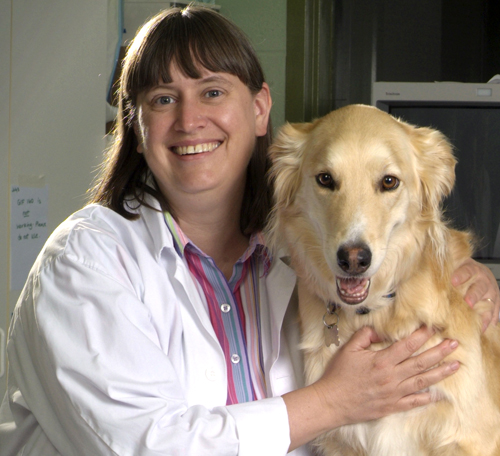
A diagnostic test intended to improve treatment of human breast cancer is now under investigation by University of Guelph researchers for potential use in dogs with lymphoma.
Prof. Brenda Coomber, Biomedical Sciences, leads researchers in the Ontario Veterinary College (OVC) in a new study meant to improve cancer therapy for dogs. She’s working with Prof. Paul Woods, Clinical Studies, and Prof. Dorothee Bienzle, Pathobiology, on a project funded by a $27,000 grant from the OVC Pet Trust Fund.
Lymphoma in dogs is one of the most common types of cancer in companion animals; it resembles non-Hodgkin’s lymphoma in people. Canine patients with this disease undergo chemotherapy involving multiple rounds of four drugs.
In about four out of five dogs, this treatment leads to complete remission of the cancer, measured by shrinkage of lymph nodes to normal size. But about half of those dogs with complete remission will suffer a relapse within six months and will need new treatment.
Second-line therapies exist to treat dogs that fail to achieve remission and those that relapse and develop resistance to existing drugs. Currently, all dogs are treated using the standard approach; second-line therapies are used when that approach fails.
Clinicians need a better way to tell sooner which dogs will have a longer remission and which ones will have a short remission or none at all, says Coomber.
Certain molecules called biomarkers can help in predicting disease outcome or response to therapy. Cancer researchers are looking for reliable biomarkers that can be easily measured and help to improve treatment.
Rna Diagnostics, a company based in Toronto, has developed a novel biomarker based on RNA. The test, called the RNA disruption assay (RDA), measures degradation of genetic material.
In a clinical trial with human breast cancer patients, the company showed that RDA can pinpoint which patients will not respond to their chemotherapy. That trial was sponsored by the National Cancer Institute of Canada. Rna Diagnostics plans more human tests.
Dr. Ken Pritzker, a pathologist and chief executive officer of the company, says, “We’re also interested in using this test to help with dog cancers, canine lymphoma, because the response to therapy is similar. Some of the animals respond and some do not.”
He expects the OVC team’s research will also help his company refine its product. “We’re very impressed by what they’re doing and their approach to trying to understand how these drugs work in animal cancers.”
The Guelph team will test RDA’s use for predicting relapse in dogs with lymphoma being treated with the conventional drug protocol. They will sample dogs being treated at OVC’s Mona Campbell Centre for Animal Cancer and send samples to the company for analysis.
The researchers plan to test 34 dogs. The centre treats hundreds of dogs with cancer each year.
Coomber says pet owners are usually keen to help with such studies.
“You’d be surprised how many owners who come to our facility to treat their dog ask, ‘Is anything being done to understand this better or is there anything we can do so others don’t have to go through this?’”
The study is not designed to alter treatments for dogs in the trial. If the study results are promising, future clinical trials would investigate how to use the biomarker for treating dogs with lymphoma.
Coomber says a routine diagnostic test for therapy response would help clinicians decide earlier whether to use the standard drug cocktail for a particular animal or switch to another treatment.
She and Woods are co-directors of Guelph’s Institute for Comparative Cancer Investigation, involving cancer researchers from across campus.